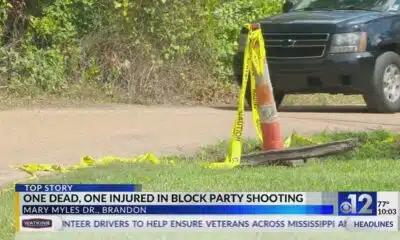Mississippi Today
Private business ticketed uninsured Mississippi vehicle owners. Then the program blew up.
Politically connected members of a Mississippi company have fallen out with their Georgia partner in what promised to be a profitable business to snare uninsured motorists with cameras and artificial intelligence.
A company that the three Mississippians formed, QJR LLC, is suing its partner in the uninsured motorist ticketing venture, Georgia-based Securix LLC. QJR represents the first initials of its members: Quinton Dickerson, Josh Gregory and Robert Wilkinson.
Dickerson and Gregory are Republican political operatives in Jackson who have run numerous state and local campaigns and advise many of the state’s top elected officials. Wilkinson, a Coast attorney, has represented local governments and government agencies.
But Judge Neil Harris has sealed the case, leaving the public in the dark about the specifics. Mississippi Today has filed a motion in the case, arguing that the file should be opened to the public.
An attorney representing the three Mississippians said in a document submitted in federal court, where the case was temporarily moved, “The case involves highly sensitive issues implicating local officials, reputational harm, and ongoing injunctive relief.”
The uninsured motorist program that Securix brought to Mississippi proved contentious from the start. In Ocean Springs, some vehicle owners were angry when they learned artificial intelligence had been used to ticket them for driving without insurance.
The Securix program has resulted in several lawsuits, including one in federal court that accuses Securix of deceiving vehicle owners by essentially posing as a law enforcement agency through its mailed citations in Ocean Springs. By April 2023, the city had canceled its contract with Securix LLC.
And there is the secret Chancery Court file. A January 2025 transcript in federal court hints that politics are involved in the chancery case and also describes what that lawsuit is about.
The transcript says the Mississippians, operating as QJR LLC, are suing Securix in Chancery Court for defamation.
“They (QJR) want to stop the defamation from ruining political careers,” an attorney for Securix said. “That’s their argument.”
The chancery lawsuit, the federal transcript says, also seeks to dissolve Securix Mississippi LLC, a 50-50 partnership QJR and Securix formed to spread the program to other cities.
Securix attempted to move the Chancery Court case to federal court, but a federal judge ruled in January that he didn’t have jurisdiction and returned it to Chancery Court.
The federal transcript says Securix Mississippi pulled in $1.3 million in a year through uninsured motorist citations but, at the time of the hearing, had less than $75,000 in assets. The judge also noted that “revenue has fallen off a cliff since August of 2024 for Securix Mississippi LLC.”
August 2024 also happens to be when the Department of Public Safety pulled the plug on the program, DPS records show.
DPS Commissioner Sean Tindell, whose agency oversees uninsured motorist enforcement, had reservations from the start about a private company ticketing motorists. Complaints about how the program was being operated, he said, prompted him to cut off Securix’s access to the data it needed to determine whether a vehicle was insured.
While QJR was successful in getting the chancery case sealed, the company had no such luck when it tried to have the federal transcript closed from public view.
A federal magistrate judge ruled on QJR’s motion to seal the transcript, citing federal court cases that said: “The public’s right of access to judicial proceedings is fundamental,” and, “Judicial records belong to the American people; they are public, not private, documents.”
Uninsured motorist program launches in MS
Securix LLC was incorporated in Delaware in 2018 and signed its first Mississippi contract in May 2021 with Shea Dobson, then the mayor of Ocean Springs, after approval by the Board of Aldermen.
Securix, based in Georgia, uses automatic license plate readers, usually mounted on traffic signals, to capture images of license plates. With the help of artificial intelligence, Securix can extract license plate numbers from the images.
Jonathan Miller, an owner of Securix LLC, initially came to Mississippi and talked to Ocean Springs Police Chief Mark Dunston about the program, said Dunston, who has since retired. Dunston presented the program to the Board of Aldermen, he said, and was later paid by Securix to present the program in other cities during off hours and after his retirement.
It is unclear when Miller met Josh Gregory and Quinton Dickerson, who did not want to comment for the story because the Chancery Court case is sealed. Miller, the chairman of Securix LLC, is also a named defendant in QJR’s lawsuit. He also declined to comment about matters involving the litigation.
Gregory and Dickerson both worked on former Gov. Haley Barbour’s 2003 political campaign, then formed Ridgeland-based Frontier Strategies. Gregory was a top political adviser to former Gov. Phil Bryant.
Billed as a full-service advertising agency, Frontier landed a lucrative state contract shortly after Barbour took office in 2004, within six months of the company’s formation. The company has gone on to contract with other state agencies and work on state and local political campaigns.
The third member of QJR, Robert Wilkinson, was serving as city attorney for Ocean Springs when Dobson signed its Securix contract. Wilkinson said he met Miller at that time but they did not have a business relationship until six to 10 months after Ocean Springs signed on with Miller’s company.
Wilkinson said he was impressed with the Securix program because it added cameras in the city that could also alert law enforcement officers to crimes, such as kidnappings or wanted suspects on the loose.
“That’s why everyone was fired up,” he said.
Another reason some welcomed the program is because Mississippi has a high rate of uninsured drivers, according to the nonprofit Insurance Research Council. In 2023, the latest year for which statistics were available, the institute reported that Mississippi had the highest rate of uninsured drivers in the nation at 28.2%.
“Unisured motorists in Mississippi is a big problem and I think we need to do more to solve that issue,” DPS Commissioner Tindell said.
“It does create a situation where everybody has to pay more for insurance because there are so many people without it.”
Vehicle owners sue Securix
Securix used its program to identify and ticket the owners of uninsured vehicles, federal court records show. Data on insured motorists was essential to the program.
Under state law, Tindell’s office maintains the Mississippi Vehicle Insurance Verification System — bulk data on the state’s insured motorists that is regularly updated. DPS operates and maintains the system through third-party vendor HDI Solutions Inc.
Law enforcement officers use the system all the time. When they run a license plate, the system lets an officer know if the vehicle is insured. But agencies generally do not have access to HDI’s bulk data.
Initially, Commissioner Tindell was unwilling to commit his agency — and its HDI data — to the Securix program.
“I don’t know that it’s necessarily the best policy to privatize our court system with diversion programs,” Tindell said. “I think those are government functions.”
Tindell also questioned whether a camera could be used to issue a ticket to an uninsured driver. State law says law enforcement agencies can access the system only during traffic stops and accident investigations. And state law forbids using the system’s insurance information as the only reason for a traffic stop.
He also was unsure whether a city could set up a diversion program through a private company.
For its initial foray into Mississippi with the city of Ocean Springs, Securix reached a data-sharing agreement directly with HDI, a letter from an HDI attorney shows.
“We basically said we’re not going to object to it,” Tindell said, “but that’s something y’all need to work out yourselves.”
With access to insured driver data, Securix began sending out citations from its Ocean Springs cameras.
If a vehicle was not listed as being insured, a ticket went to the owner. The system did not identify the person driving the vehicle.
On their face, the citations claimed to be uniform traffic tickets that, at first glance, appeared to be from the police department.
Soon enough, Securix faced a federal lawsuit filed by three Mississippi residents ticketed as uninsured motorists.
They are seeking class-action status to represent thousands of individuals who they believe received citations from Securix. In just a few months, the lawsuit says, 6,000 people were ticketed in Ocean Springs alone.
“Pretending to be law enforcement,” the lawsuit says,”defendant (Securix LLC) has made millions of dollars collecting fees from individuals who allegedly violated state uninsured vehicle laws.”
In a response filed in federal court, Securix denies any wrongdoing, saying the company “at all times acted in good faith” and followed state law.
The Ocean Springs citation offered three options: Call a toll-free number and provide proof of insurance, enter a diversion program that charges a $300 fee and includes a short online course and requires agreement that the vehicle will not be driven uninsured on public roadways, or contest the ticket in court and risk $510 in fines and fees, plus the potential of a one-year driver’s license suspension.
Court fight over uninsured motorist data
After signing the contract in Ocean Springs, Securix LLC began working with Josh Gregory and Robert Wilkinson to sign up other cities.
Company leaders convinced Pearl, Biloxi and Senatobia to join the program.
Josh Gregory and Robert Wilkinson pitched the program in Senatobia, March 2022 minutes from the Board of Aldermen’s meeting show. Gregory told aldermen that 70% of the public response to the program was positive in Ocean Springs.
Senatobia even took the Department of Public Safety to Circuit Court, filing a lawsuit in Tate County that demanded access to the state agency’s insured driver data.
By the time the city and DPS reached a settlement agreement in August of 2023, HDI had cut off Securix’s access to insured driver data.
An HDI attorney sent Securix LLC a default notice in December 2022. An HDI review showed Securix personnel issued citations in Ocean Springs without first having a police officer run the license plate information through the insurance verification system, a contract requirement, the notice said.
The notice required Securix LLC to submit a corrective action plan and document the company’s future contract compliance.
In March 2023, HDI terminated its agreement with Securix LLC. The termination letter said Securix had failed to respond to the notice of termination or submit a corrective action plan. Securix, through chairman Jonathan Miller, later maintained that an Ocean Springs police officer, not the company, authorized each citation.
Months later, the Securix settlement agreement with DPS stipulated that HDI would be authorized to once again provide Securix access to the insurance verification system.
Senatobia came to count on the revenue, board meeting minutes show. But the program would not last — in Senatobia or any other Mississippi city.
Securix program falls apart
In early August 2024, Tindell received a letter from Jonathan Miller of Securix LLC that raised questions about the way the program was operating, Tindell said.
“Based upon his letter, we had concerns that there wasn’t a proper law enforcement control system in place,” he said.
Tindell sent HDI a letter at the end of the same month that mentioned questions had been raised about the Securix program. Tindell asked HDI to “immediately discontinue sharing or providing data relating to any programs involving Securix or QJR.”
QJR filed its lawsuit to dissolve the company less than a month later. In the civil litigation, QJR is also alleging Miller has defamed the Mississippi business partners, which Miller has denied.
Although the chancery case is sealed, Securix and Securix Mississippi have been unable to avoid publicity. E. Brian Rose, managing editor of the website GCWire and a former congressional candidate, has written numerous pieces about Securix’s business deals.
But access to the Chancery Court file could give the public more information about the automatic license plate reading business.

In its motion to unseal the file, Mississippi Today attorney Henry Laird asks Harris to hold a hearing that gives the news outlet a chance to argue the file should be opened, as case law has established.
At the hearing, Harris would also need to consider alternatives to closing the file.
“Even if the on-the record-evidence would be so compelling so as to allow the court to redact specific documents or place them under seal,” Laird argues in his motion, quoting a pertinent case, that ‘does not warrant sealing the entire case from public view’.”
This article was produced in partnership between the Sun Herald and Mississippi Today.
This article first appeared on Mississippi Today and is republished here under a Creative Commons Attribution-NoDerivatives 4.0 International License.
The post Private business ticketed uninsured Mississippi vehicle owners. Then the program blew up. appeared first on mississippitoday.org
Note: The following A.I. based commentary is not part of the original article, reproduced above, but is offered in the hopes that it will promote greater media literacy and critical thinking, by making any potential bias more visible to the reader –Staff Editor.
Political Bias Rating: Center-Right
This article reports on a complex business and legal dispute involving politically connected Republican operatives and a private company running an uninsured motorist ticketing program in Mississippi. The tone is largely factual and investigative, focusing on the controversy without overt editorializing. However, by highlighting the political ties of QJR LLC’s founders and the legal conflicts surrounding the privatization of traffic enforcement, it subtly underscores tensions between private enterprise and public oversight, reflecting concerns often raised in center-right discourse about government functions versus private-sector roles. Overall, it maintains a primarily neutral stance with slight center-right contextual framing.
Mississippi Today
Financial Fun in the Sun: Summer Money Lessons for the Whole Family
A new school year will be here before we know it, which represents more than just a return to the classroom. It presents an opportunity to instill essential life skills, like financial literacy. This season is an ideal time for parents to introduce their kids to the fundamentals of money management, including saving, budgeting, and responsible spending.
To help prepare for the year ahead, Chase is hosting a Back-to-School Family Finance event that will feature fun activities, financial health workshops, and more for kids of all ages.
- When—Saturday, June 28 from 10 a.m. to 2 p.m.
- Where—Mississippi Civil Rights Museum (222 North St., #2205, Jackson, MS 39201)
- What—Attendees will enjoy free haircuts, interactive games, and financial health activities designed for all ages to learn the importance of budgeting, smart spending, and the valuable resources available to them. Plus, while supplies last, students will receive a free backpack filled with school supplies.
In addition to joining Chase at the June 28 event, here are a few important lessons parents and kids can learn to help on the first day of school and beyond.
Start With Saving
Whether it’s allowance, gifts, or earnings from a summer job, teaching kids to track and save their money is essential in developing good financial habits. Saving toward specific goals and understanding the time it takes to reach those can help children grasp the true value of money.
Chase provides families with the tools and resources to make saving easy, like Autosave, by setting up automatic monthly transfers from your Chase checking account to your savings account. All managed through the Chase Mobile® App, parents can help their child set a savings goal to ensure they build a strong financial foundation.
Next, Begin Budgeting
As you approach the tween and teen years, financial needs and desires for independence will evolve. They might take on part-time jobs, save up for larger goals (like a car), and begin managing more of their own finances. This is a great opportunity for them to learn the basics of budgeting.
Chase’s Monthly Budgeting Worksheets help make this process simple. Start by entering monthly income and expenses to help your teen differentiate “needs” and “wants.” This helps them see where their money is going and is important as they begin cashing and spending their first paychecks.
Then, Grow Their Finances
Transitioning from high school to college or stepping into the real-world post-graduation comes with a new set of responsibilities. Amidst managing studies, jobs, and future planning, young adults need both guidance and practical tools to help.
The Chase Mobile app tracks earnings, savings, and expenses, and makes it easy to send and receive money with Zelle®.
Just as kids progress from one grade to the next, they can grow their understanding and management of money too. Opening their first bank account is a great complement to these financial lessons. Check out Chase First BankingSM, Chase High School CheckingSM, and Chase College CheckingSM, to see which account works best for your student or, learn more at chase.com/StudentBanking.
| Chase First Banking Designed for kids ages 6-12, the parent-owned account with a debit card for kids and no monthly service fee. | High School Checking For teens 13-17, the co-owned account allows students to set up direct deposit and automate savings. |
Chase College Checking For college students 17-24, the account can be managed through the Chase Mobileapp and allows users to send and receive money via Zelle. |
Don’t miss this exciting opportunity to connect, learn, and prepare for the school year. We look forward to seeing you there!
Chase Mobile® app is available for select mobile devices. Message and data rates may apply.
Zelle and Zelle related marks are wholly owned by Early Warning Services, LLC and are used herein under license.
Bank deposit accounts, such as checking and savings, may be subject to approval.
JPMorgan Chase Bank, N.A. Member FDIC.
This article first appeared on Mississippi Today and is republished here under a Creative Commons Attribution-NoDerivatives 4.0 International License.
The post Financial Fun in the Sun: Summer Money Lessons for the Whole Family appeared first on mississippitoday.org
Note: The following A.I. based commentary is not part of the original article, reproduced above, but is offered in the hopes that it will promote greater media literacy and critical thinking, by making any potential bias more visible to the reader –Staff Editor.
Political Bias Rating: Centrist
This article presents a neutral, factual overview of financial literacy initiatives targeted at families and students, without promoting a particular ideological stance. The content is educational and practical, focusing on empowering parents and children with money management skills. It highlights resources from a major financial institution (JPMorgan Chase) and describes community events, tools, and services in a straightforward manner. There is no loaded language or partisan framing, and the article refrains from advocating specific political or economic policies, instead emphasizing universally accepted personal finance principles and community engagement.
Mississippi Today
‘We shall see’: Plasma donation center hailed as sign of ‘revitalization’ in southwest Jackson remains but a lifeline for residents with few job prospects
The man in a Dallas Cowboys baseball hat would rather be home sleeping, but instead he was sitting in a car in the parking lot of the plasma donation center, eating Cheetos and waiting on his brother and friend inside.
His family members regularly give their plasma – the liquid component of blood used in a variety of medical applications – for extra cash, but he said he never will.
“That’s not too much my style,” he said just before 10 a.m. Tuesday, wiping the sweat from his face with a gray washcloth. “I just like to go to work and go back home.”
The 37-year-old man said he’s happy with his job at a car wash, which he’s held for most of his adult life after dropping out of school in the ninth grade. He wished not to give his name, but described the freedom offered through his occupation as “music to me.”
“I can just work the way I want to work,” he said.
Many of the others who visited the Jackson ImmunoTek Plasma Donation Center on a recent weekday morning haven’t struck the same when it comes to earning a living in this part of the city.
The plasma donation center, located at the intersection of McDowell and Raymond roads on the cusp of west and south Jackson, is one of the few signs of life in an otherwise neglected zone. Family members and friends pick up and drop off their loved ones; people walk to the center from nearby neighborhoods.
It’s almost as busy as the Cash Savers, a discount grocery store catty-cornered from the biotech center, where people often take the pre-paid debit cards they receive in exchange for their blood to buy groceries. The intersection also includes a gas station, a Rally’s fast food restaurant, an empty store that locals say used to sell car parts and an AutoZone.
“They put it in the right spot of town,” said the man waiting for his brother outside the center. The hours are 7 a.m. to 2 p.m.
He was describing the plasma center’s convenient location on two main thoroughfares, but he’s right for another reason: This area of Jackson has a high concentration of poverty, few economic opportunities and is rapidly depopulating.
The dire economic situation is top of mind for the city’s new leadership, as incoming Mayor John Horhn has pledged to reverse these trends, telling attendees at the South Jackson Parade and Festival earlier this year that it would be the first thing on his to-do list.
Similar promises came with the center’s opening in 2022 inside a former pharmacy that closed during the Great Recession. That year, ImmunoTek boasted that it could bring an estimated economic boost of $5 million a year for a “part of Jackson that is undergoing revitalization,” according to the Mississippi Free Press.
The company did not respond to inquiries from Mississippi Today, so the center’s exact economic impact in the years since is unknown. For now, ImmunoTek remains one of the newest establishments operating in this part of Jackson and was likely drawn by the same data points that make other investors look elsewhere.
“It’s amazing how the blood of a group of people was used as a commodity at the beginning of this country and how the blood of this same group of people is still being a commodity today by them having to sell it in order to survive,” said Fredrick Womack, founder of Operation Good, a violence prevention organization.
Womack said when his group has encountered people walking to ImmunoTek from the surrounding neighborhoods, he’s attempted to intercept them and help them find stable, long term employment.
Studies have shown that plasma donation centers are more likely to be located in areas with higher rates of poverty. In Jackson, the ImmunoTek center is located in a census tract where the median household income was $29,500 in 2020, according to data compiled by the city of Jackson. And CSL Plasma, another plasma donation company, has facilities in south and northwest Jackson.
“Regardless of how you feel about the community, businesses – for lack of a better word – match with the outputs of the demographic,” said Jhai Keeton, the director of Jackson’s planning and development department.
Keeton has been working to bring more development to west and south Jackson, but he said recruiting businesses to the area has proven difficult due in part to the concentration of poverty, by which he means lower median household incomes, less spending power and declining property values.
“What I would love for the greater community to understand is that economics is all about data,” he said. “Every individual needs to look at themselves as a dataset, and when you have 100 individuals in one neighborhood, they need to look at themselves as a collective dataset.”
When it opened, the center offered a larger payout for a plasma donation than it does now, said Darian Little, a cook at Buffalo Wild Wings who had donated blood Tuesday to get money for groceries. He said he used to get $100 per session, but that now the center offers him $40 for the first and $70 for the second.
Nonetheless, the facility remained consistently busy throughout the morning. In the 45 or so minutes it takes, and even with the lower going rate, a donor can still earn 10 times the state’s minimum wage of $7.25-an-hour.
Several people had stopped in to ImmunoTek on their way to work. One woman wore a blue Waffle House shirt. Another left the facility wearing nursing scrubs and a blue bandage on her arm.
Others came because it was their only source of income. As the morning wore on, the center’s parking lot started to fill up with people.
Anderson Wallace was sitting on the curb, waiting for his pulse to fall below 100 so he could make a donation. He has visited ImmunoTek four times a month since he arrived in Jackson from Brooklyn, New York, earlier this year to visit his mom.
If Wallace had been able to find employment, he wouldn’t be here, he said. But he’s applied everywhere – Amazon, UPS, and various jobs through Indeed.com – with no luck.
“It’s too tough down here,” he said. “I gotta go back to New York.”
Two sisters whose electricity had gone out this morning after they were late paying the bill had also tried to donate, but their iron was too low, so the center turned them away. One of them shrugged when asked what they were going to do instead.
Deonte Woodson’s iron was also too low, so while his partner was inside giving a donation, he sat on the hood of his car and soothed their baby. The 30-year-old said he has a couple of businesses, though he didn’t give specifics, and his partner aspires to be a TV reporter. But for now, they need to donate plasma to make ends meet.
“She ain’t doing nothing now, just being a housewife,” he said. “For right now, I try to handle all the bills and take care of the kids.”
Ella Moore, a former Dillard’s employee, was waiting in her father’s car to pick up her 32-year-old son who was inside. Moore said her son is in between construction jobs. A few years ago, the young man tried to gain steady employment by starting his own mobile car wash, but he got into an accident, Moore said, leaving him without a car.
Moore grew up in Jackson and has raised her kids here, but she can’t make sense of the city. She said she used to shop at a corner store by her house, but a few months ago, a man came in holding a rifle, and the shopkeeper did nothing. She doesn’t shop there anymore.
“I think people just don’t care no more, because ain’t nobody really listening to them,” she said. “It’s like they ask you a question and they say they’re gonna do this, they’re gonna do that, but in reality, they really don’t do it. You’re voicing your opinions on things, and there’s nothing happening.”
When was the last time she felt Jackson’s leaders were listening? Moore pursed her lips.
“Probably in the early 90s,” she said, citing an example of a skating rink on Terry Road that closed, then reopened after community uproar.
But a few years later, Moore went by the rink, and it was closed again. Now she feels like there’s nothing for her grandkids to do in south Jackson, she said, except for a small park up Raymond Road from the plasma donation center.
She voted for Horhn, because she wanted to see change in Jackson, but she is skeptical that any will come. When she heard on the news that part of the Metrocenter Mall had a new owner, it just made her think about the last time people promised to redevelop the shopping center.
“We shall see, we shall see, we shall see,” she said. “Cause that would’ve been a nice thing to have a skating rink right there, a water park for the kids. Another era.”
This article first appeared on Mississippi Today and is republished here under a Creative Commons Attribution-NoDerivatives 4.0 International License.
The post ‘We shall see’: Plasma donation center hailed as sign of ‘revitalization’ in southwest Jackson remains but a lifeline for residents with few job prospects appeared first on mississippitoday.org
Note: The following A.I. based commentary is not part of the original article, reproduced above, but is offered in the hopes that it will promote greater media literacy and critical thinking, by making any potential bias more visible to the reader –Staff Editor.
Political Bias Rating: Center-Left
This article presents a mostly factual account of economic hardship and plasma donation in a low-income area of Jackson, emphasizing social and economic challenges faced by residents. The tone is sympathetic toward those struggling with poverty and skeptical of political promises, which aligns with a center-left perspective focused on economic inequality and community revitalization. However, it avoids partisan language or overt advocacy, reporting on the situation and voices of residents and local leaders with measured concern. The framing highlights systemic issues without pushing a strong ideological agenda, maintaining an overall centrist tone with a slight lean toward progressive social concerns.
Mississippi Today
Girls learn construction skills at summer camp
MAYHEW, Miss. – A summer camp for girls in northeast Mississippi is designed to help produce the next generation of skilled construction workers.
FORGE’s Girls Construction Camp brought together 12- to 15-year-old girls last week for mentorship, interactive workshops and hands-on experience in the traditionally male-dominated field of construction.
This is the program’s second year, and 24 campers participated, double last year’s number. The camp took place at East Mississippi Community College’s Golden Triangle campus.
FORGE is a nonprofit organization dedicated to increasing awareness of skilled trades among young people.
“We start out young, work with them as they grow, hoping to get more and more interested in construction and the skilled trades,” said Melinda Lowe, FORGE’s executive director.
Demand for workers in construction and other skilled trades is growing. The Bureau of Labor Statistics projects the U.S. will have an average of 663,500 job openings per year in construction and extraction until 2033. This field has a median annual wage of $58,360.
Christee Roberson is owner and founder of West Point-based Graham Roofing. She is also a founding member of FORGE and a trade partner for the camp. She and her team taught the girls about roofing.
Roberson said it’s important to introduce construction and other trades to young people, especially girls.
“I think, being a female in the industry and never knew that this was something I could do, it’s important for sure to show other females that they can be in the trades, too,” she said.
Aveline Webb, 12, of Starkville was a first-time camper.
“We have been building our boxes,” Webb said. “We put up drywall. We’ve done roofing, electrical, plumbing, all the stuff that you would need to build a building.”
In addition to the lessons, the campers heard from guest speakers and worked in groups on a central project – building and decorating food pantry boxes.
Jada Brown, 15 from Lowndes County, attended the camp last year and came back as student mentor.
“What I hope they take away is knowing how to build and wanting to want to do it in the future, and see themselves doing it,” she said.
Lowe said the camp provides useful information even for those who don’t enter construction.
“We already have one young lady who has been helping her family replace some shingles that were damaged in a recent storm,” Lowe said. “We’ve had others who have fixed the stoppers in their sink, because they learned here how to fix that.”
The food pantry boxes will be placed in and around Lowndes County in the coming weeks.
This article first appeared on Mississippi Today and is republished here under a Creative Commons Attribution-NoDerivatives 4.0 International License.
The post Girls learn construction skills at summer camp appeared first on mississippitoday.org
Note: The following A.I. based commentary is not part of the original article, reproduced above, but is offered in the hopes that it will promote greater media literacy and critical thinking, by making any potential bias more visible to the reader –Staff Editor.
Political Bias Rating: Centrist
This article provides straightforward reporting on a summer camp teaching construction skills to young girls, focusing on education, empowerment, and workforce development. It highlights the camp’s positive impact without promoting any partisan or ideological agenda. The language is neutral and fact-based, emphasizing the growing demand for skilled trades and the importance of encouraging female participation. There is no evident political framing or bias, as the piece centers on community, education, and economic opportunity rather than controversial or ideological issues.
-
Mississippi Today5 days ago
Lawmaker probing Mississippi’s prisons finds inmates suffering from treatable diseases as corrections asks for more money
-
News from the South - Tennessee News Feed5 days ago
New laws to take effect in Tennessee July 1 – The Tennessee Tribune
-
News from the South - Georgia News Feed6 days ago
Juneteenth celebrations march on in Georgia amid national DEI reversals and cutbacks
-
News from the South - North Carolina News Feed4 days ago
Stolen car suspect with 100-plus charges released, arrested again
-
News from the South - Georgia News Feed5 days ago
Proposed sale of millions of acres of public land under GOP budget bill prompts backlash
-
News from the South - Oklahoma News Feed5 days ago
Oklahoma’s Prison Food Service Contract Voided
-
News from the South - Florida News Feed5 days ago
‘Out of balance:’ Seminole County sheriff asks for $16M more as county mulls tax hikes
-
News from the South - Florida News Feed5 days ago
‘Not compatible with the area:’ 236-acre sports complex raises concerns in Marion County






















































